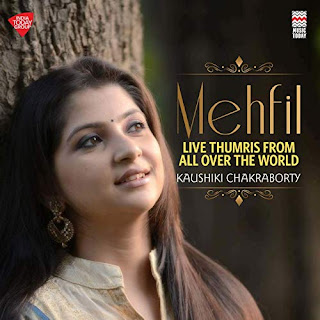Mehfil/ Kaushiki Chakraborty - thumri
By Narendra Kusnur
Album: Mehfil - Live Thumris From All Over The World
Artiste: Kaushiki Chakraborty
Genre: Thumri
Label: Living Media
Rating: ****
The daughter of renowned vocalist Pandit Ajay Chakraborty, Kaushiki Chakraborty is a torch-bearer of the Patiala gharana. Her soothing voice, characteristic style and command over technique have earned plenty of accolades, making her one of the leading vocalists of her generation.
Kaushiki has also faced criticism from a section of purists, who feel she uses excessive ornamentation and strays from the mood of the raags she presents. Often, they dismiss her “vocal acrobatics” at concerts as nothing but show-womanship.
Now, this is something that many exponents of the Patiala gharana have been accused of general. However, one can't but help admire the finesse of their taans and clarity of their sargams.
One of the gharana’s specialities is the rendition of light classical Punjab ang thumris, in many cases made famous by legends like Ustads Bade Ghulam Ali Khan and Barkat Ali Khan. And this is what Kaushiki is heard presenting on Mehfil, a collection of thumris and dadrad collated from live concerts from various unnamed parts of the world.
With five simple songs talking of love, separation and despair, Mehfil is the kind of compilation that grows on repeated hearing. There is no scope for verbal calisthenics here, and on each tune, Kaushiki displays soulfulness and serenity.
The slowly-built alaap on the dadra 'Saajanwa Kab Aaoge’, sung in raag Pahadi and set to Subhajyoti Guha’s six-beat dadra taal, is so melodic and intricate that you want it to go on. The words “Saajanwa kab aaoge, haan main kitthey guzaaroon din saara” are easy to understand, with Ajay Joglekar providing perfect accompaniment.
As is common with many thumris, Kaushiki goes in for a fair balance of mishra (mixed) raags. There is Mishra Mand on ‘More Saiyyan’, where she sings “More saiyyan bedardi ban gaye, koi jaago manaao”. Well-constructed sargam patterns and lines that slowly connect with each other are the highlights of this thumri, set to the eight-beat keharwa taal.
The extra-popular raag Bhinn Shadja composition ‘Yaad Piya Ki Aaye’, popularised by Bade Ghulam Ali Khan, comes up next, with Sandip Ghosh playing the keharwa taal and Paromita Mukherjee on harmonium. The lines “Yaad piya ki aaye, haay yeh dukh sahaa na jaaye, haay Ram” are followed by an energetic tabla burst. Suddenly, Kaushiki meanders into a few lines of ghazal maestro Ghulam Ali’s ‘Apni Tasveer Ko Aankhon Se Lagaata Kya Hai’, a move which could elicit mixed reactions. The thumri ends with a supple laggi (accelerated rhythmic cycle), typical of compositions of the genre.
The Mishra Charukeshi piece ‘Saiyyan Mora Re’, which talks of separation and longing, is followed by the concert favourite ‘Saiyyan Nikas Gaye’. This Mishra Bhairavi dadra, known for a variant sung by Lata Mangeshkar and Bhupinder Singh in the film Satyam.Shivam Sundaram, has been given exquisite treatment by Kaushiki. Check out the emotion on the lines “Rangmahal ke dus darwaaze, na jaane kaunsi khidki khuli ho.”
Over the years, Kaushiki has shown dexterity in khayal and thumri, using the Patiala style as her base. She also has an all-woman classical-fusion band Sakhi. In another project, she recently worked with violinist-composer Deepak Pandit and lyricist Manoj Muntashir on the ghazal ‘Tera Khayal’, released as a single.
Such versatility is necessary and important in today's times, specially to attract the younger generation. For its part, Mehfil is a welcome edition to her discography, as it sticks to the nuances of the traditional style, and is yet capable of reaching out to a wider audience.




Comments
Post a Comment